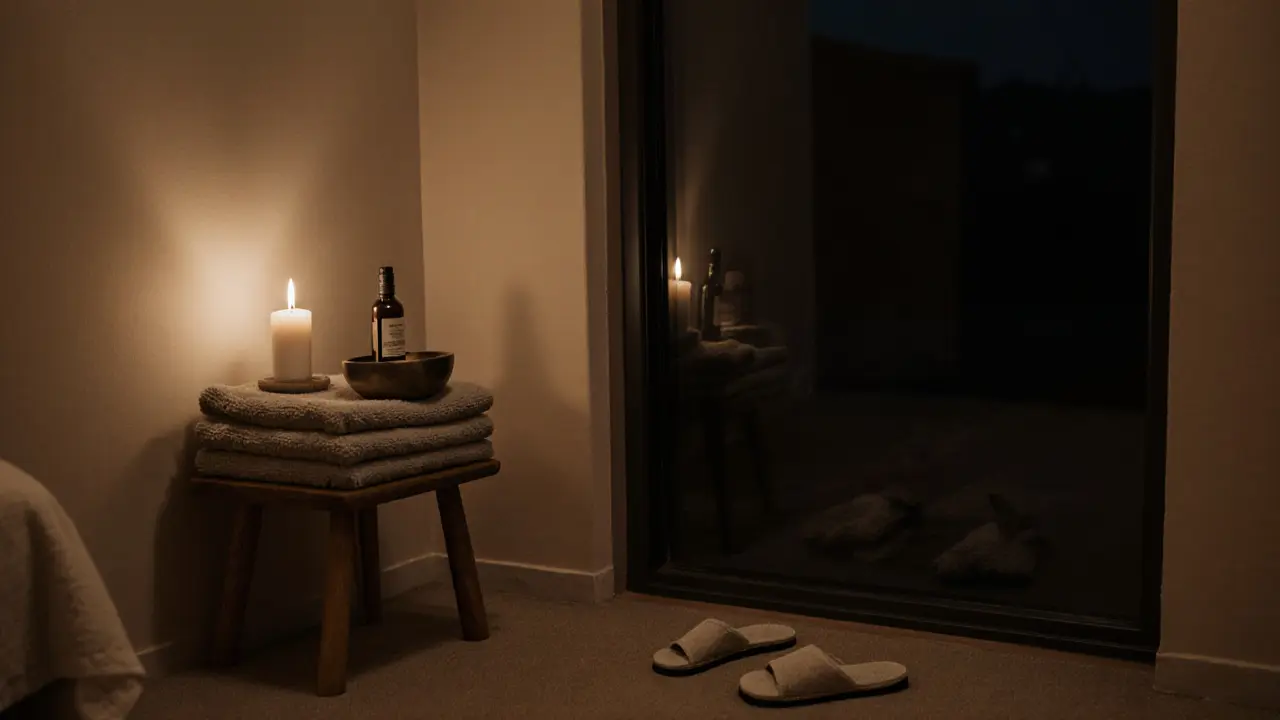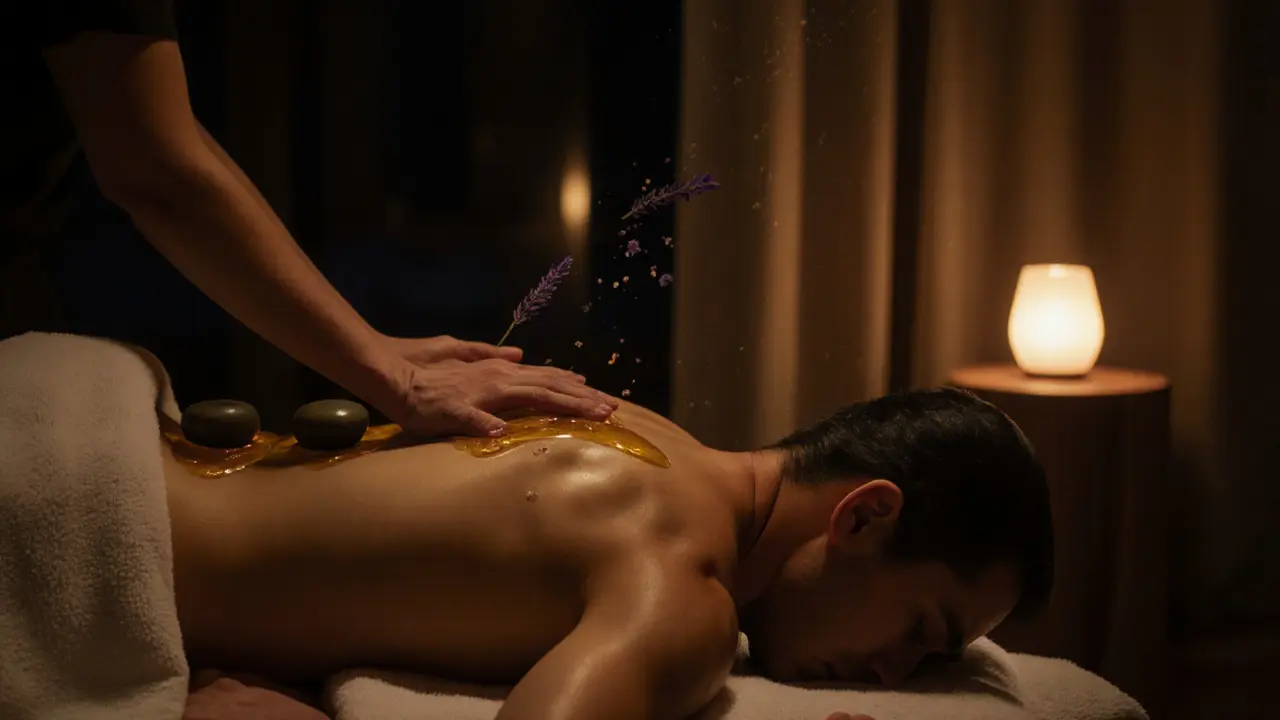There’s something about a body massage at night that sticks with you-not just because of the pressure on your shoulders or the warmth of the oil, but because of the quiet, the stillness, the way time slows down. It’s not just therapy. It’s a ritual. And when done right, it becomes a night you remember for years.
Why Nighttime Makes All the Difference
Daytime massages are practical. You squeeze one in between meetings, after the gym, before picking up the kids. Nighttime massages are different. They’re intentional. The lights are low. The room smells like lavender or sandalwood. No alarms. No emails. Just you, the therapist, and the rhythm of your breathing. Studies from the University of Miami’s Touch Research Institute show that evening massage reduces cortisol levels by up to 31% compared to morning sessions. That’s not just relaxation-it’s a reset. Your nervous system finally drops its guard. Your muscles, tight from hours of sitting or standing, start to melt. And for many, that’s when the real healing begins.The Elements of a Memorable Massage Night
A great massage night doesn’t happen by accident. It’s built around five simple, powerful elements:- Temperature - Warm oil, heated stones, or a towel warmed on a radiator. Cold hands or stiff sheets break the spell. The right warmth makes your body say, “I’m safe.”
- Sound - Not silence. Not music either. Just soft, ambient noise. Rain falling, distant jazz, or the hum of a Himalayan singing bowl. Too much rhythm distracts. Too little makes you tense.
- Touch - Not too firm, not too light. A skilled therapist reads your body. They know when to press into your lower back and when to glide gently over your neck. It’s not about technique-it’s about listening with their hands.
- Space - No clutter. No phones. No open doors. Even the smell of coffee from the kitchen next door can ruin it. A massage room should feel like a cave-protected, private, quiet.
- Connection - Not sexual. Not emotional. Just presence. The therapist doesn’t chat. They don’t ask how your week was. They’re there, fully, without distraction. That’s the gift.
One client in Manchester told me she came in after her divorce. Every Friday, she booked a 90-minute massage. She never spoke. She just cried. After three months, she stopped crying. She started smiling. She didn’t say why. She didn’t have to.
What Makes a Massage Night Unforgettable?
The best massage nights aren’t the most expensive. They’re the ones where something shifts inside you. I’ve seen people leave with tears in their eyes. Others laugh out loud-something they hadn’t done in months. One man, 62, told me he hadn’t felt relaxed since his wife passed. He came every Tuesday. After six months, he started walking his dog again. He said the massage was the first time in two years he felt like he could breathe. It’s not magic. It’s biology. Deep tissue work triggers the parasympathetic nervous system-the part of your brain that says, “You’re not in danger.” When that kicks in, your body does what it’s designed to do: repair, restore, renew. And at night? That’s when your body is already primed for it. Melatonin rises. Your heart rate drops. Your muscles are looser. A massage at 8 p.m. isn’t just a treatment-it’s a natural extension of your body’s rest cycle.
What to Avoid
Not all massage nights are created equal. Here’s what kills the vibe:- Too much talking - If the therapist asks you about your job, your kids, or your ex, they’re not focused on you. They’re performing.
- Overly perfumed oils - Synthetic fragrances trigger headaches. Look for therapists who use cold-pressed, organic oils. Jojoba, sweet almond, or grapeseed are quiet allies.
- Being rushed - A 30-minute “express” massage at night defeats the purpose. If you’re going for a night you’ll remember, give yourself at least 60 minutes. Ninety is better.
- Doing it at home with a partner - Don’t get me wrong-couples’ massages are lovely. But if you’re looking for true release, go alone. It’s harder to let go when someone else is in the room, even if they love you.
Real Stories From Real Nights
A nurse from Salford came in after a 12-hour shift. She was exhausted-not just tired, but hollowed out. She didn’t say much. The therapist used warm stones along her spine and slow, deep strokes on her hips. After 75 minutes, she fell asleep. When she woke up, she didn’t want to leave. She sat there for ten minutes, just breathing. She came back the next week. And the week after that. A university student, 21, booked a massage after failing her finals. She thought it would be a quick fix. Instead, she cried for twenty minutes straight. The therapist didn’t say a word. Just kept working. When she left, she texted her mom: “I think I’m going to be okay.” These aren’t outliers. They’re normal. The body remembers what the mind forgets. And sometimes, all it needs is an hour of quiet pressure to remind you who you are.How to Find the Right Place
Not every spa is built for this. Look for places that:- Offer evening slots (after 6 p.m.)
- Have private rooms with no windows to the hallway
- Use natural, unscented or lightly scented oils
- Allow you to arrive early and sit quietly before your session
- Don’t push add-ons like aromatherapy or reflexology unless you ask
Ask for a therapist who specializes in “relaxation” or “therapeutic touch.” Avoid places that advertise “sensual” or “erotic” massage. Those aren’t about healing. They’re about performance.
Check reviews for phrases like “I felt safe,” “I cried,” or “I didn’t want to leave.” Those are the signs you’re looking for.

What Happens After
Don’t rush out. Drink water. Sit for ten minutes. Let your body settle. You might feel light-headed. That’s normal. Your nervous system just came out of deep rest. Some people feel euphoric. Others feel numb. A few feel angry. All are okay. Massage doesn’t just loosen muscles-it releases stored tension, emotions, memories. It’s not always gentle. But it’s always honest. The next day, you might notice you sleep better. You breathe deeper. You don’t clench your jaw as much. These aren’t side effects. They’re the results.Make It a Habit
One night won’t change your life. But one night a month? That’s a revolution. Start small. Book one massage a month. No more. No less. Treat it like a doctor’s appointment-non-negotiable. Your body will thank you. Some people keep a journal after their sessions. They write down how they felt before, during, and after. Others just sit quietly in the car afterward, listening to one song they love. There’s no right way. Just your way.Final Thought
You don’t need a fancy spa. You don’t need a luxury resort. You just need one night where you let someone else hold your weight-literally and figuratively. Where you stop trying to fix everything. Where you just… are. That’s the night you’ll never forget.Can body massage at night help with insomnia?
Yes. A 2020 study in the Journal of Clinical Sleep Medicine found that participants who received weekly evening massages reported falling asleep 37% faster and sleeping 28% longer over eight weeks. The deep pressure stimulates the vagus nerve, which lowers heart rate and signals your body it’s time to rest.
Is it normal to cry during a massage?
Absolutely. Massage releases stored emotional tension, especially in areas like the hips, shoulders, and chest. Many people carry grief, stress, or trauma in their muscles. When those areas are gently released, emotions can surface. It’s not weakness-it’s healing.
How often should I get a body massage for best results?
Once a month is the sweet spot for most people. It’s enough to maintain the benefits without becoming a financial burden. If you’re under high stress, every two weeks helps. But don’t overdo it-your body needs time to integrate the changes.
Should I shower before or after a massage?
Shower before if you’ve been sweating or wearing heavy perfume. After? Wait at least 30 minutes. Your skin is still absorbing the oil, and showering too soon washes away the therapeutic benefits. Let the oil sit-it’s part of the treatment.
Can I get a massage if I’m pregnant?
Yes-but only with a therapist trained in prenatal massage. Avoid deep pressure on the abdomen and inner thighs. Side-lying positions are safest. Many women find evening prenatal massages help with swelling, back pain, and sleep. Always check with your doctor first.







There’s something about the way warmth and silence work together that just unravels everything you’ve been holding onto. I used to think massage was just for sore muscles, but after my first nighttime session, I realized it’s the only time in my week I don’t feel like I need to perform. No replies. No deadlines. Just breath. And yeah, I cried. 😭 It wasn’t sad-it was like my body finally got to say what my mind wouldn’t let me speak.
Now I do it every third Friday. No excuses. My therapist knows me by my breathing pattern now.
Let’s be real-this whole ‘nighttime massage as healing ritual’ thing is just corporate wellness propaganda dressed up in lavender oil. The real reason you feel better? You’re lying down for 90 minutes without your phone. That’s not magic, that’s basic human biology. The ‘parasympathetic nervous system’? Yeah, it’s real-but so is the fact that your body was designed to rest, not to be sold a $150 service to do what sleep and silence should’ve done naturally.
And don’t get me started on ‘emotional release.’ That’s just trauma tourism with a side of aromatherapy. People cry because they’re exhausted, not because their hips ‘hold grief.’ You don’t need a spa-you need a therapist, a bed, and a rule to stop scrolling at 10 p.m. But hey, if selling you a candle and a sob session makes someone rich, more power to ‘em. 🤡
I work as a massage therapist in Bangalore, and I see this every week. People come in with clenched jaws, shoulders up to their ears, and eyes that haven’t blinked in hours. I don’t say much. I just warm the oil, dim the lights, and let their bodies lead.
One man came every Tuesday for six months. He never spoke. One day, he handed me a note: ‘Thank you for not asking.’ That’s when I knew this wasn’t about technique-it was about permission. Permission to be still. To be human.
And yes, crying happens. Not because it’s weak, but because the body keeps score. And sometimes, only touch can read the ledger.
Also, avoid synthetic fragrances. They trigger migraines. Always go for cold-pressed. And never rush the aftercare. Sit. Breathe. Drink water. Let the oil sink in.
While I deeply appreciate the thoughtful exploration of the therapeutic benefits of nighttime massage, I would like to respectfully underscore the importance of consistency and intentionality in integrating such practices into one’s wellness regimen.
As a practitioner with over fifteen years of experience in somatic therapy, I have observed that the most enduring results arise not from isolated sessions, but from disciplined, monthly engagement with restorative touch. The nervous system requires repetition to rewire habitual patterns of tension.
Additionally, I would encourage individuals to prioritize environments where the therapist’s presence is non-intrusive yet fully attuned. The absence of conversation is not silence-it is sacred attention.
May your nights be gentle, your oils pure, and your breath unhurried.
Bro. This. This right here is the secret sauce nobody talks about. You think you need a vacation? Nah. You need one night where you let someone else hold your body while your brain shuts the hell up.
I used to think massage was for rich people or people who ‘do yoga.’ Then I went after a 72-hour work sprint-no sleep, three coffees, and a panic attack in the bathroom. The therapist didn’t say a word. Just pressed into my lower back like she knew I’d been holding my breath since 2019.
I woke up sobbing. Not because I was sad. Because I remembered what it felt like to be safe.
Now I book it like it’s my damn oxygen. And yeah, I cry. And I don’t care. My body doesn’t lie. Your phone does.
Also-skip the fancy spa. Find the quiet one with the guy who reads books in the break room. Those are the real healers.
Okay, but why is this even a thing? Why do we need to pay $120 to cry? Why can’t we just… lie on the floor? Watch Netflix? Breathe? This whole narrative is engineered by the wellness-industrial complex to make you feel guilty for not buying your way to peace.
And the ‘no talking’ rule? That’s just control. They don’t want you to ask why your hips ‘hold trauma.’ They want you to leave with a receipt and a new Instagram story.
Also-‘melatonin rises at night’? Duh. That’s why we sleep. You’re not unlocking some ancient secret. You’re just lying down. With oil.
Stop romanticizing avoidance. Your body doesn’t need a massage. It needs you to stop working 14 hours a day and go to bed at a reasonable hour. But hey, if you wanna spend your paycheck on a sob session, go ahead. I’ll be here, sleeping like a normal human.
One hour. That’s all it takes to remember you’re alive.
Not perfect. Not fixed. Just… present.
And that’s enough.